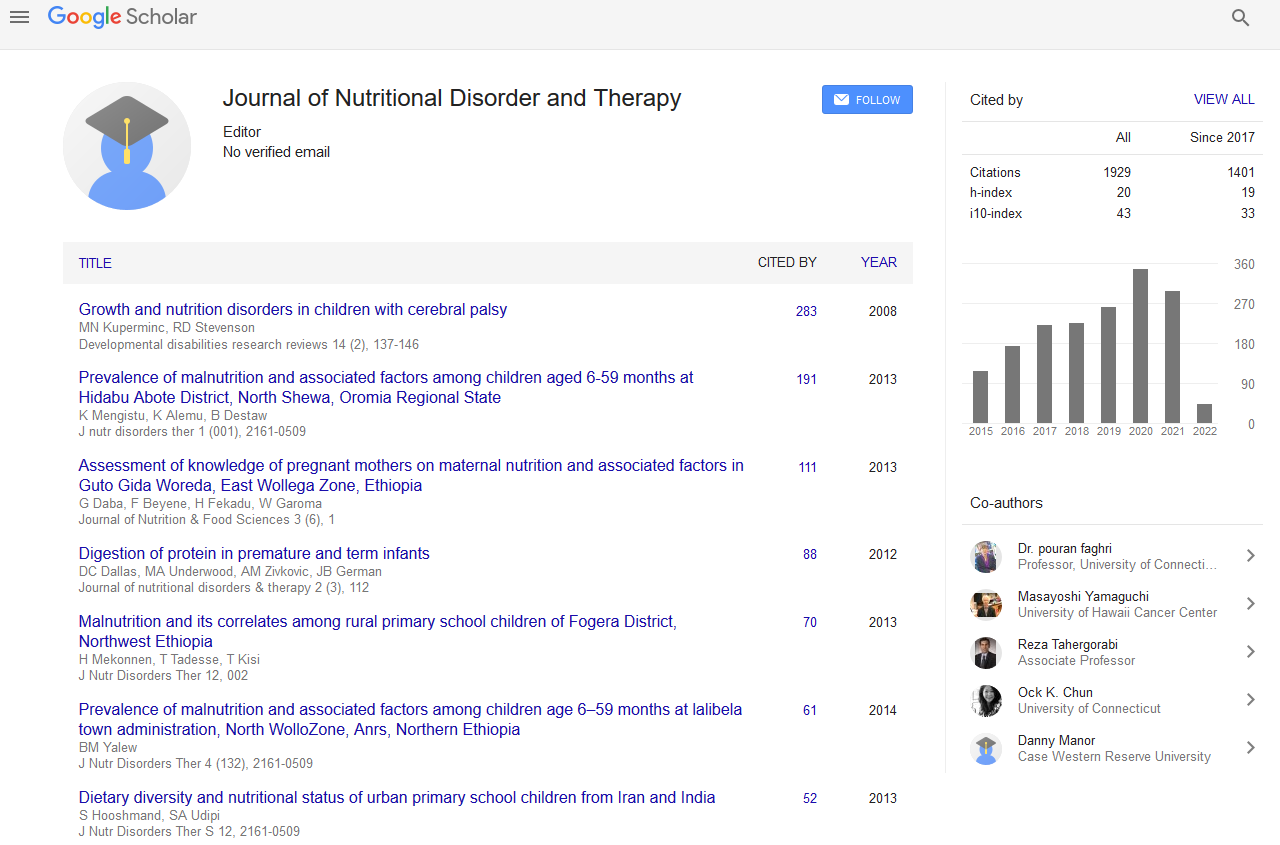Indexed In
- Open J Gate
- Genamics JournalSeek
- Academic Keys
- JournalTOCs
- Ulrich's Periodicals Directory
- RefSeek
- Hamdard University
- EBSCO A-Z
- OCLC- WorldCat
- Publons
- Geneva Foundation for Medical Education and Research
- Euro Pub
Useful Links
Share This Page
Journal Flyer

Open Access Journals
- Agri and Aquaculture
- Biochemistry
- Bioinformatics & Systems Biology
- Business & Management
- Chemistry
- Clinical Sciences
- Engineering
- Food & Nutrition
- General Science
- Genetics & Molecular Biology
- Immunology & Microbiology
- Medical Sciences
- Neuroscience & Psychology
- Nursing & Health Care
- Pharmaceutical Sciences
Effect of varying magnesium concentrations on NF-úB gene expression in human umbilical vein endothelial cells (HUVECs)
JOINT EVENT: 13th International Congress on Advances in Natural Medicines Nutraceuticals & Neurocognition & 14th International Conference on Clinical Nutrition
July 27-29, 2017 Rome, Italy
Lujain Abdulaziz Almousa, A M Salter and S C Langley-Evans
Princess Nora Bint Abdulrahman University, KSA
The University of Nottingham, UK
Scientific Tracks Abstracts: J Nutr Disorders Ther
Abstract:
Magnesium has anti-inflammatory and antioxidant effects, and it has a defensive role in triggering the body�??s immune cells. Moreover, magnesium enhances endothelial function and inhibits atherosclerosis. Inflammation is a risk factor for atherosclerosis progression and can be mediated by nuclear factor kappa-light-chain-enhancer of activated B cells (NF- κB) activation, which plays a key role in the development of inflammation because when NF-κB transfers to the nucleus and binds to promoter regions, it initiates the transcription of many inflammatory mediators. In response to inflammation, NF-κB enhances the transcription of Intercellular Adhesion Molecule-1 (ICAM-1), Vascular Cell Adhesion Molecule-1 (VCAM1) and inflammatory cytokines, which aid in the transmigration of leukocytes from the blood vessel lumen through the barrier of the endothelial cells and into the subendothelial space. In this study we determined the effect of different concentrations of magnesium on the expression of NF-κB. HUVECs were cultured in different MgSO4 concentrations: 0.1 mM, 5 mM and compared to the physiological circulating concentration (1 mM). Expression of NF-κB was determined at the mRNA level by quantitative real-time PCR. Significantly elevated NF-κB expression was observed in magnesium-deficient (0.1 mM) cells that were stimulated with lipopolysaccharide 0.5 μg for 4 hours (34%, P=0.032), Moreover, a marked suppression of NF-κB expression in the magnesium-treated (5 mM), LPS stimulated HUVECs was observed (31%, P=0.048), relative to the 1 mM physiological concentration. These data shows that magnesium was inversely associated with the expression of NF-κB which induces an overexpression of the inflammatory phenotype in endothelial cells and has been connected to the pathogenesis of many cardiovascular diseases.
Biography :
L A Almousa has completed her Doctorate program in Human Nutrition from College of Food & Agricultural – King Saud University in 2012, Master’s in General Nutrition from Prince Nora University in 2007 and Bachelor’s degree in Nutrition and Food Science, Prince Nora University in 2002. At present, she is studying for a PhD degree at the University of Nottingham (UK).


